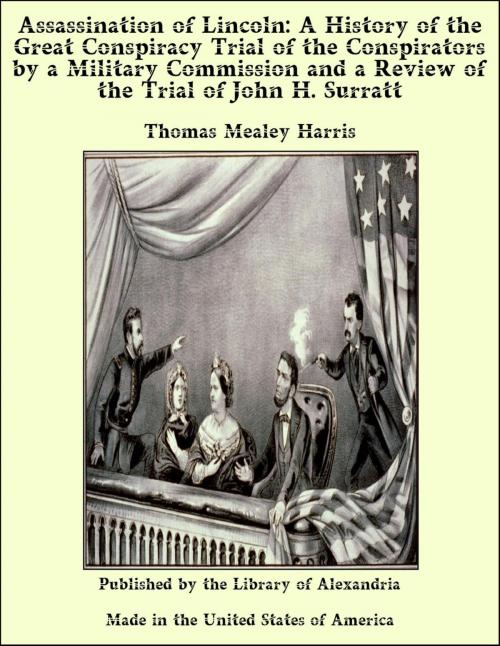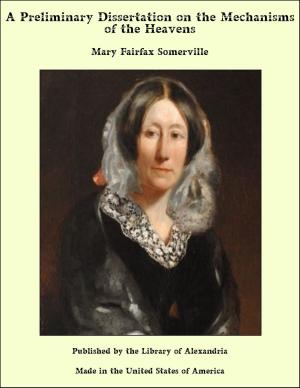Assassination of Lincoln: A History of the Great Conspiracy Trial of the Conspirators by a Military Commission and a Review of the Trial of John H. Surratt
Nonfiction, Religion & Spirituality, New Age, History, Fiction & Literature| Author: | Thomas Mealey Harris | ISBN: | 9781465582010 |
| Publisher: | Library of Alexandria | Publication: | March 8, 2015 |
| Imprint: | Language: | English |
| Author: | Thomas Mealey Harris |
| ISBN: | 9781465582010 |
| Publisher: | Library of Alexandria |
| Publication: | March 8, 2015 |
| Imprint: | |
| Language: | English |
The rebellion of the slave-holding states, and the attempt to establish a separate government by force of arms, was solely in the interest of the institution of slavery. The Southern Confederacy was to rest on this institution as its corner-stone. By the establishment of the Confederacy it was intended to end, forever, the agitation of this question, and establish the system of human slavery as one of the permanent institutions of the world. And all this in the nineteenth century of the Christian era! Preparatory to this the pulpit and the press had been suborned, the Christian conscience of the country had been debauched, and the doctrine that slavery was a Divine institution was taught, and accepted as true, by one-half of the American people. A doctor of divinity, or even a common preacher, who could prove this to his own satisfaction, and that of his hearers, at once achieved popularity, and had his great learning and ability heralded by the secular press throughout the South land. Neither was this kind of preaching confined to the South. It found a distinct and earnest echo in many places in the North. It was argued, and no doubt sincerely believed, that slavery was the best condition for securing the happiness and welfare of the African race—the condition in which the negro could be most useful to the world; that his condition had been greatly improved by his transplantation from a heathen land and the environments of barbarism to a Christian land and civilized and Christian environments; and that subjection to a higher and superior race was necessary to his deriving the highest benefit from the change. Slavery, it was taught, was a patriarchal institution, and that it was only through it that the highest ideal of human civilization could be attained. It was natural that a people whose judgment had crystalized around such opinions as these should be intolerant of opposition, as they had closed the door to discussion on this question; and so for several generations a contrary opinion was not tolerated, or allowed to find expression, in the slave-holding states. The agitation of this question, in its moral aspects, by constantly increasing numbers of earnest, able men in the North, at last led to the organization of a political party opposed to this institution, and the question of slavery thus became a political question.
The rebellion of the slave-holding states, and the attempt to establish a separate government by force of arms, was solely in the interest of the institution of slavery. The Southern Confederacy was to rest on this institution as its corner-stone. By the establishment of the Confederacy it was intended to end, forever, the agitation of this question, and establish the system of human slavery as one of the permanent institutions of the world. And all this in the nineteenth century of the Christian era! Preparatory to this the pulpit and the press had been suborned, the Christian conscience of the country had been debauched, and the doctrine that slavery was a Divine institution was taught, and accepted as true, by one-half of the American people. A doctor of divinity, or even a common preacher, who could prove this to his own satisfaction, and that of his hearers, at once achieved popularity, and had his great learning and ability heralded by the secular press throughout the South land. Neither was this kind of preaching confined to the South. It found a distinct and earnest echo in many places in the North. It was argued, and no doubt sincerely believed, that slavery was the best condition for securing the happiness and welfare of the African race—the condition in which the negro could be most useful to the world; that his condition had been greatly improved by his transplantation from a heathen land and the environments of barbarism to a Christian land and civilized and Christian environments; and that subjection to a higher and superior race was necessary to his deriving the highest benefit from the change. Slavery, it was taught, was a patriarchal institution, and that it was only through it that the highest ideal of human civilization could be attained. It was natural that a people whose judgment had crystalized around such opinions as these should be intolerant of opposition, as they had closed the door to discussion on this question; and so for several generations a contrary opinion was not tolerated, or allowed to find expression, in the slave-holding states. The agitation of this question, in its moral aspects, by constantly increasing numbers of earnest, able men in the North, at last led to the organization of a political party opposed to this institution, and the question of slavery thus became a political question.















